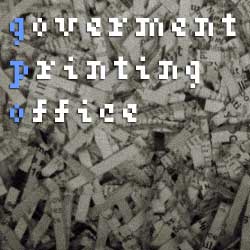 It’s a bad week for government documents. OMB Watch recently reported that the House voted to cut funding to the Government Printing Office. This comes as no surprise, given the recent budget drama, and it’s not likely to get a lot of mainstream attention with looming cuts to entitlement programs and the military funding.
It’s a bad week for government documents. OMB Watch recently reported that the House voted to cut funding to the Government Printing Office. This comes as no surprise, given the recent budget drama, and it’s not likely to get a lot of mainstream attention with looming cuts to entitlement programs and the military funding.
It’s important for those of us that advocate for government transparency and open access to take note, however. The GPO is the office tasked with preserving and disseminating federal documents. Cuts to its budget means less access to the law for people who can least afford to pay for it.
According to Library Journal, the budget cuts effectively defund FDSys. FDSys is actually the “system of record” for the GPO, which began migrating content off its old site, GPOAccess in December 2010. We blogged about planned migration of PACER court data to FDSys back in May.
In a related note, federal courts have slated millions of archived court records for destruction, in order to save money. iWatch reports that “The plan is to destroy all records on cases that did not go to trial that were filed between 1970 and 1995. For other records, the federal judiciary has reduced the current record retention time from 25 to 15 years in an effort to cut costs. All cases that went to trial or were filed before 1970 will be kept.” The courts plan to save “historically important” case files, such as those involving “state reapportionment cases, civil rights voting cases, treason, national security, family farm, historic bankruptcy cases, and death penalty habeas corpus cases.”
According to the Third Branch post, 13 district court and 23 bankruptcy courts have already completed their audit of important cases. The United States District Court for the Western District of Michigan announced its plans to destroy these archives on their site, and put out a call for assistance in identifying historically important cases.
